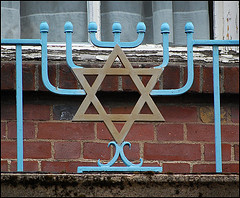We know next to nothing about Meir ben Elijah: not his
date of birth, what he looked like or how he spent his life in
medieval
England. Shakespeare's life, by
comparison, is well documented. However, we do know that he
lived in Norwich because the acrostics in his Hebrew poems tell
us so. In his long poem about the Exodus we are told: 'I
am Meir, son of Rabbi Elijah from the city of Norwich,
which is in the Isle called Angleterre'.

Six-pointed star at Norwich Synagogue
The rest of his life remains supposition. Did he
write the poems in Norwich or were they written
after the expulsion of the Jews in 1290? Did he actually
survive the expulsion? And how did the
manuscripts of his poems end up in the Vatican archive
in Rome? Nevertheless, the fact that he left
a tangible record of his life in the City at the end of
the 13th Century is really quite remarkable. It is also
a testament to the age and breadth of Norwich's
literary heritage
V.D. Lipman's book The Jews of Medieval Norwich
tells us that there was a thriving Jewish quarter in the
city at this time and that it was located between
the Haymarket, Orford Place and White Lion Street. There
was also a synagogue which is believed to have stood
close to the site of the present-day Lamb Inn.
The most interesting of Meir's poems from an
historical perspective is undoubtedly
Ode to Light
which is a powerful piece of writing telling of
the oppression and suffering of the Jewish community. In
the fourth verse he
states that: 'We languish, suffering in the land/ And hear the brute's insults,/And steadfastly do we endure/ While waiting for the Light.'
He continues in the next verse: 'A heavy yoke on us they lay/ Commanding and compelling/That we abandon and forsake/ Our only hope and Light.'
Meir is quite clearly trapped in England at a time of great unrest.
The poem concludes: 'Since midst mine enemies I'm placed/ Arise and plead my cause/Uphold the Kingdom of my Lord/ Let Light shine through the Light.'
There is one clue to Meir's identity because the records
show that there was a Jew
called Milo Kat living in Norwich around 1290 and it has
been suggested that 'Milo' is an equivalent for 'Meir'.
In the sixteen short poems another acrostic tells us that he is: 'Meir son of
Elijah the Hozeh' and Lipman has suggested that his father may
have been an astronomer for the word 'Hozeh' can be
translated as 'seer'. There is evidence to support this,
Lipman claims, in the fact that the Jewish community had
a scientific leaning - evidenced by the presence of two physicians,
the father and son Isaac and
Solomon, and that Solomon had the earliest recorded herb
garden in England.
Meir's work shows characteristics of German, Northern
French and Spanish Hebrew 'piyyut' poems - i.e. that
they are liturgical in form and frequently feature
acrostics. They were originally discovered in the
Vatican Library by Abraham Berliner (1833-1915) who was
a German-based expert in Jewish history and literature.
Translations of the poems are available in the local
studies section at The Forum in Norwich.
After the expulsion in 1290, there was no Jewish community in
Norwich again until the middle of the 18th Century. A new
synagogue was built in 1849 on Mountergate, but it was
unfortunately destroyed during the air raids of 1942.
The synagogue today is located on Earlham Road opposite
the Roman Catholic Cathedral.
Norwich has another Jewish literary link in
the form of Arnold
Wesker's play Blood Libel which was first
performed at the Playhouse in 1996. It took as its
subject the ritual murder of a boy named William of
Norwich whose body was discovered on
Mousehold Heath in
1144.
The Jewish community of the time were accused of
slaughtering a Christian boy to use his blood for
Passover. The play enacts the accusations and
counter accusations and the belated attempt to turn
William into a martyr.
|

